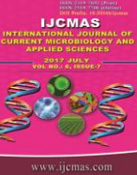


 National Academy of Agricultural Sciences (NAAS)
National Academy of Agricultural Sciences (NAAS)

|
PRINT ISSN : 2319-7692
Online ISSN : 2319-7706 Issues : 12 per year Publisher : Excellent Publishers Email : editorijcmas@gmail.com / submit@ijcmas.com Editor-in-chief: Dr.M.Prakash Index Copernicus ICV 2018: 95.39 NAAS RATING 2020: 5.38 |
Watershed management is the meant to containing the deterioration of natural resources for maintaining the ecological balance and sustainable economic development. This paper presents the brief review about various aspects of the Participatory rural appraisal (PRA) approaches in watershed management. The purpose of PRA is to make possible development practitioners, university and state department officials, and local people to work together to plan context suitable programs. Several government and NGOs are operation in the participatory watershed projects successfully completed and going on. The components of PRA consist of methods, performance and attitude and sharing thoughts with the other beneficiaries. The PRA work was the used in the semi structured interviews, transect walk, timeline, wealth matrix etc. are common techniques. Many workers evaluated the PRA in terms of soil erosion, measures taken to arrest erosion, groundwater recharge, soil moisture retention, soil fertility and productivity, crop and cropping systems, agricultural earnings, productivity of non-arable lands, and household welfare. The major bottleneck in adoption of this approach is a lack of coordination amongst the donors, government bodies, and the NGOs. Newly latest innovations, such as relevance of geographical Information systems (GIS) are very common thereby attractive its affirmative impact in improving the Socio-economic status of farmers
 |
 |
 |
 |
 |